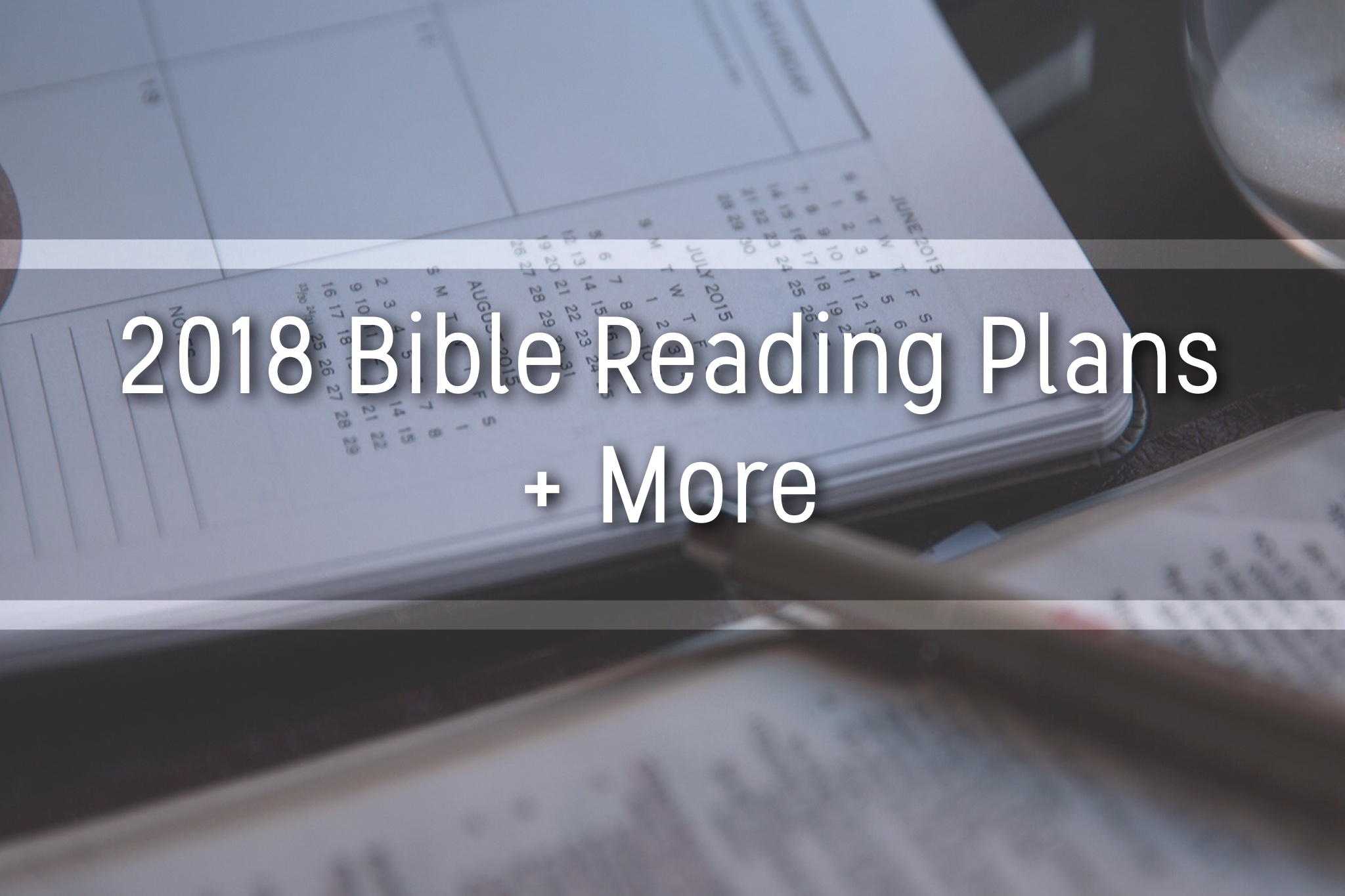2018 Update: This is a post originally written for the 2016 year. I’m updating it again for the third year. I’ve also included recommendations for a few devotionals to accompany your daily Bible reading, books to help you in your communion with God, as well as a recommendation for a book on productivity in the New Year. I hope this post helps you reach your goals!
And hey, before you get started, can I just be honest? I fell off my plan the past few months. In fact, you could say I’ve been completely undisciplined in this area. Perhaps you find yourself in a similar spot, maybe even ashamed because you couldn’t stick to your 2017 goal. The good news is, there is grace for us when we fail; grace that picks us up to keep going. Our Father is not ashamed of you for trying – and you shouldn’t be either.
I want to persuade you to start a personal Bible reading plan for 2018. But first, a personal anecdote.
I used to be one of those people who scoffed at the concept of Bible reading plans. All of these books and calendars that aim to help Christians read through the Bible in a certain length of time just seemed too “restrictive” to me. I had convinced myself that whenever I read the Bible, it needed to be something I felt like doing. Besides, if I try to read through the Bible in a year, how could I possibly study every intricate detail of each passage that I read? Instead, I told myself that it was better to study one book in depth at a time, so that I could learn it like the back of my hand.
Unfortunately, my excuses were just my own spiritual blindness and hard-heartedness. Between having convinced myself that Bible reading needed to come from the motivation of my emotion and feelings, combined with the fact that I wanted to read extremely slowly (and focus more on a commentary than the Biblical text itself) – the end result was that I read very little Bible. So little, in fact, that it wasn’t until recently that I actually read through the entire Bible.
Can you relate to making excuses as it pertains to reading your Bible? What excuses do you make? Does your job get in the way? Your kids? Is there “just not enough time in the day”? We all do it. My goal here is not to get you to feel down on yourself, but instead I want to encourage you by providing some practical reasons why you should use a Bible reading plan, as well as give you some practical helps on how to do this in 2018.
Why Should I Use a Bible Reading Plan?
The simple reason? Because you need to read your Bible, and I have yet to meet someone who regularly reads through their Bible that doesn’t use some sort of plan or calendar to assist them with it. In case you need some convincing as to why you should be regularly (daily) reading your Bible, here are a few reasons why it is so important for a Christian to do:
- God speaks through his written Word (Isaiah 55:11, Luke 24:27, John 1:1, Col 3:16, 2 Tim. 3:16-17, Heb. 1:1-2, 2 Pet. 1:3). Many people today ignore their Bibles with the hope that instead they can just wait and hope to hear a direct word of revelation from God himself, like when God spoke directly to Moses and Joshua, the prophets, etc. However, we must realize that in the whole discourse of the Bible, the incidents where God speaks to people directly are relatively few and far between, and they occur over a period of some 4,000 years. While we know God spoke directly to Moses, we have no evidence that God also regularly spoke to some 2 million normal Israelites who were also in the wilderness. Instead, God gave his Word to Moses, and then God’s Word was transmitted both written and orally to the people. What this means for us today is that the normal, every day pattern for us to hear God speak is through his written and preached Word. And what a privilege it is for us to have access to God’s speech in our own native language, at any time and any place!
- The Bible prepares us for war (Eph 6:10-20). The Apostle Paul is quite clear that we are engaged in an every day, spiritual battle (Eph. 6:12). The Word of God is our sword for battle (Eph 6:17, Heb 4:12). How can we fight against sin, temptation and the devil without our sword? Deprived of God’s Word, we are no better off than a soldier under fire without any weapon to shoot back. If we leave our sword on the shelf, we will inevitably try to fight a spiritual war with our own fleshly strength. This is a fight we are guaranteed to lose.
- We are called to be disciplined (Josh. 1:8, John 15:14 Rom. 12:1-2, Phil. 2:12-13, 1 Timothy 4:7). Christians are not sluggardly people. We are called to work hard at our faith and growing in grace (2 Peter 3:18). This means that we must be disciplined, even if it isn’t something you feel like doing. Sometimes the most heroic thing you can do is pursue holiness and godliness, even when you don’t feel like it. But which disciplines should you pursue? Well, there are clear ones evident in Scripture (such as reading your Bible, as I am currently making the case), and some that are not so clear. Some disciplines are mandatory for all Christians, others are a wisdom issue that Christians need to work out for themselves (such as your fasting habits and what “fasting” means for you).
- Most importantly, we need the gospel (Romans 12:2, Eph 4:23, Col 3:2). It is only through the gospel that we can change and grow to be more like Christ. Why? Because the gospel is the power of God both for salvation (Rom. 1:16) and for growth in the Christian life (1 Cor. 1:18). The gospel is how our heart idolatry is crushed and we grow in love for our Savior. And if what Jesus said in Luke 24:27 is true (it is), then the entirety of Scripture tells us about Jesus, not just the four Gospels or the New Testament.
So, if you’re still with me, I hope you’re at least allowing the concept of a Bible reading plan to stew in your mind a little bit. Maybe you were already convinced that Bible reading plans are necessary – if so, great! If not, I hope you’ve been pressed to think about this from a new angle in a way that is helpful.
Before we get into the reading plans, I just want to mention three caveats.
First, please remember that reading your Bible doesn’t earn you God’s love, nor does it grant you the forgiveness of sins. Bible reading tends to be the evangelical form of penance. We sin, mess up, or recognize that our faith is week. Then we run to the Bible, read it once or twice, and act as if we’re back in God’s favor now. It is a cycle of sin, shame and guilt. Yet, nowhere in the Bible will you find that God loves his people more or less if they don’t read his word. In fact, to my knowledge, it is nearly impossible to find a biblical command to read the Bible daily. Of course, the psalmist said the person is blessed who meditates on the law day and night. It is a joy and delight to do so – but it is not commanded of us, nor does it earn us God’s favor.
Which leads me to the second caveat. Remember, God’s people didn’t even have printed Bibles in their homes until after the Gutenberg Bible (1450’s), and even then only the rich and those with an education possessed them. Before that time, God’s people needed to gather in worship to hear the Scripture read. What a privilege it is then for us to have printed and electronic Bibles (and commentaries and other books on the Bible) so readily available! What a privilege to have the Bible in our language, a privilege which only comes to us because of the blood of martyrs!
Based on these two things, the third caveat is – don’t beat yourself up if you get off your plan. And don’t get overburdened by trying to “catch up.” If you miss 5 days, don’t feel like you need to get it all in on Saturday – of course you can, if you have time! God won’t be disappointed in you. Just keep moving forward. Don’t worry about missed days. The goal is reading more of the Bible so that we can learn more of God and commune with him. We don’t punish ourselves when we fall short.
Now regardless of what you think about a Bible reading plan, like me you might struggle with deciding which plans out there are the best, or finding a convenient way to make a plan work for you. In the next section I’m going to provide you with a few options and downloads for potential reading plans in 2018.
Which Reading Plan Should I Use?
You need to find a reading plan that works for you. My only strong suggestion is that you do your very best to find a plan that will allow you to read through the entire Bible in one year. This is not as impossible as it sounds – I promise! In order to finish the Bible in a year, you will need to read an average of 2-3 chapters per day. This takes the average adult reader about 15-20 minutes to do, and I know that everyone can find that amount of time during the day, even if it means making slight adjustments to your schedule.
I would also suggest using a plan that breaks up the Old and New Testaments evenly. Many of us try to read the entire Bible by starting in Genesis 1, but by the time we hit the book of Numbers we struggle to find any motivation to keep going. We long to return to the New Testament, and so we give up our ambitions to make it through the Bible in its entirety. This is why I think plans that switch back and forth between the Old and New Testaments are better than plans that read straight through the Bible.
Below I’ve listed three different reading plans for 2018, with a description and PDF/iCal downloads for each.
The Robert Murray M’Cheyne Reading Plan
I love this reading plan, and it is what I’ve used since the Fall of 2014. The goal of this plan is to have you read through the entire Old Testament once, and the New Testament and Psalms twice in one year. This averages out to four chapters per day. What stands out about this plan is how it is divided. You will start on January 1st by reading from Genesis 1, Matthew 1, Ezra 1, and Acts 1. You will then progress through the Bible in these four divisions, reading about two Old Testament and two New Testament chapters per day. I really love this plan because it allows you to see numerous connections between the Old and New Testaments as your reading.
The “Ben Hein” Plan
I decided to change up my plan for 2016 (I went back to M’Cheyene for 2017, but I think I’m going back to this for 2018). Rather than reading through the Bible in four divisions like the M’Cheyene plan does, I want to read larger chunks from each book of the Bible at one time. In order to do this, I have created two plans. One is to read the entire Old Testament in a year, and the other is to read through the New Testament in 6 months (which I will then repeat beginning in July). This plan will also be about four chapters per day, and will still allow me to read both the Old and New Testaments every day. The difference between this approach and the M’Cheyene approach is that I get to read through larger portions of a book at a time.
OT Plan
NT Plan (Part 1)
NT Plan (Part 2)
The “But What if I’m Terrible at Commitments?” Plan
Some of you may be persuaded of the necessity and usefulness of a Bible reading plan, but in the deepest recess of your heart you’re too scared to make a commitment because you think you might not keep it. While I want to still urge you to go for one of the plans above, I understand that this is a legitimate fear for a lot of people. So, I’ve created a plan just for you. This plan will not take you through the entire Bible. Instead, you will read through Genesis to Judges, the Psalms, and the entire New Testament. I have dispersed these three groupings evenly, such that you will read a portion of the OT, then the NT, then some Psalms, then repeat. You will only read one or two chapters per day with this approach.
Devotional Recommendations
I primarily use a few devotionals at a time. I do not stick to any one, but tend to alternate from day to day. I’ve looked at or used several in the past, but these are the four I keep coming back to:
- The Songs of Jesus – Tim Keller gave us an excellent devotional on the Psalms in 2016, and I reused it some in 2017 as well. The Psalms are underused in Evangelicalism today, which is a shame because they are the songs and prayers for God’s people. In the Psalms, we find every human emotion imaginable displayed in beautiful and honest prayer. Keller provides a short paragraph commentary on a passage, and then gives a few sentences of prayer to help you begin to pray yourself. There is a different reading for every day, so if you miss a day you can just skip to your current day rather than trying to play catch up. It is excellent!
- God’s Wisdom for Navigating Life – Here is another Keller devotional on the Proverbs which was just released. I plan to dig into this some in 2018, along with the second volume of Voices from the Past (see below). Like the Psalms, the Proverbs tend to be overlooked (and abused out of context). It is similar length to the Psalms devotional. I trust this will be a great resource.
- Voices from the Past – This devotional is a wonderful collection of excerpts from Puritan writings. If you’ve never read the Puritans, this is a great introduction to them. There is a wide selection of authors on various topics from various books. The reason I love this book is because I often feel as if I am stepping into the office of a physician for my soul. The strength of the Puritans was their ability to diagnose the maladies of the heart. As a bonus, there is a second volume that you can also use. I will probably read through the first volume again, but may pick up the second one some time this year.
- The Valley of Vision – Not a daily devotional, but a helpful guide to prayer. Sometimes we just don’t know what to pray. Sometimes we want to be educated in prayer. I think the Valley of Vision in combination with the two devotionals above provide excellent resources on learning how to pray for ourselves.
Book Recommendations
- Knowing God – This book by J.I. Packer is a timeless classic for a reason. It is the gold standard for devotional-theological works to help Christians learn more about their God and what it means to walk faithfully for his glory.
- Knowing Christ – Something of a spiritual sequel to the above book, Mark Jones has written an incredible work on Knowing Christ. What I love about this book in particular is that Jones really takes you the edge of Christ’s humanity to make you consider things you haven’t before. In the incarnation, Christ really became man. That he still possesses a body – and human limitations – is something that we could all stand to marvel at a little bit more.
- Union with Christ – I recently got into this book and it is a treasure. Union with Christ is the most important Christian doctrine that you’ve likely never heard of. Do you feel like there is a gap in your life between what the Bible promises and what you experience? Understanding your Union with Christ is the key.
- Communion with God – Here is a classic by the Puritan John Owen. It is not as difficult to read as most of Owen’s works because it has been abridged and slightly updated for modern readers. If you’ve heard people talk about Owen but haven’t gotten into him yourself, this would be a great place to start.
- Devoted to God – This book by Sinclair Ferguson is a wonderful encouragement for sanctification. He teaches us what life in godliness and holiness can really look like.
- A Little Book on the Christian Life – John Calvin’s devotional classic is a short but incredibly powerful take on what the Christian life looks like – in our obedience, in our sin, and our need for the grace of God.
Productivity Recommendation
My life can get pretty chaotic, as I have multiple commitments that require me to juggle multiple tasks. Unfortunately, I am pretty terrible at prioritizing. I’ve tried to get by on my own without any help the last several years, but this year I’ve decided it is time to be more disciplined and orderly with my time and commitments.
To that end I’ve picked up a copy of Tim Challies’ Do More Better. I was pleasantly surprised by his biblical foundation for Christian productivity. After helping you lay the foundation, he then gets into practical recommendations (largely following GTD principles – “getting things done”) for tools and software that can help you. This book may help you reach your goals in 2018 – including your reading plans!
I hope this article has been helpful for you. May God richly bless you as you seek to honor and glorify him by reading and studying his Word in 2018.






